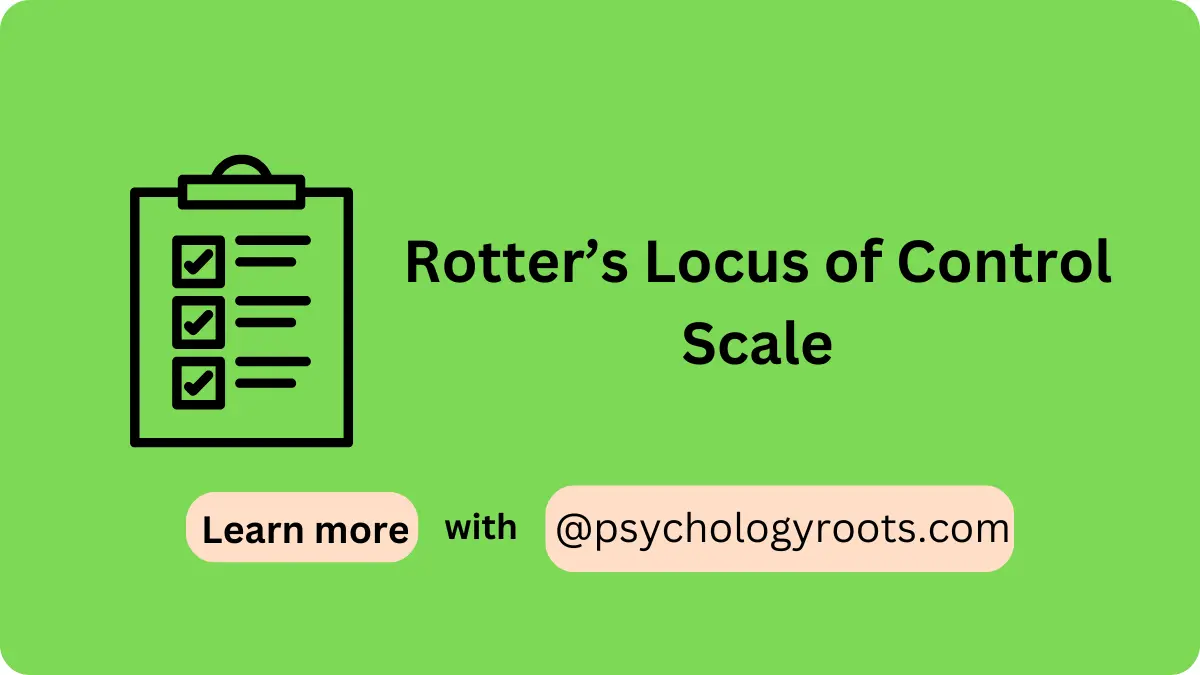Table of Contents
Rotter’s Locus of Control Scale
Here in this post, we are sharing the “Rotter’s Locus of Control Scale”. You can read psychometric and Author information. We have thousands of Scales and questionnaires in our collection (See Scales and Questionnaires). You can demand us any scale and questionnaires related to psychology through our community, and we will provide you with a short time. Keep visiting Psychology Roots.
About Rotter’s Locus of Control Scale
Scale Name
Rotter’s Locus of Control Scale
Author Details
Julian B. Rotter
Translation Availability

Background/Description
Rotter’s Locus of Control Scale (1966) is a self-report measure developed to assess individual beliefs about control over life events. This scale evaluates whether an individual perceives events as primarily influenced by their own actions (internal locus of control) or by external forces beyond their control (external locus of control). The scale is widely used in both research and clinical contexts to measure control beliefs and has been applied across diverse populations to explore its influence on behavior, motivation, and psychological well-being.
The scale consists of 29 items in a forced-choice format, where respondents select one of two statements that best represents their beliefs. The scale has been influential in studying the role of locus of control in areas like academic achievement, health behaviors, and psychological resilience.
Administration, Scoring and Interpretation
- Ensure participants understand the instructions and the purpose of the scale.
- Explain that there are no right or wrong answers and that they should choose the statement they feel best describes their beliefs.
- Participants read each pair of statements and choose one that aligns most closely with their view.
- Scoring instructions are kept private to maintain the integrity of responses.
Reliability and Validity
- Reliability: Internal consistency ranges from 0.65 to 0.79, while test-retest reliability ranges from 0.49 to 0.83, indicating moderate stability and consistency in measuring locus of control.
- Validity: The scale has shown negative correlations with the Marlowe-Crowne Social Desirability Scale (-0.41 to -0.12), suggesting minimal influence from socially desirable responding.
Available Versions
29-Items
Reference
Jb, R. (1966). Generalized expectancies of internal versus external control of reinforcements. Psychological monographs, 80, 609.
Read Also: https://www.psychologyroots.org/factors-derived-from-fatalism-scales-and-their-relationship-to-health-related-variables/
Important Link
Scale File:
Frequently Asked Questions
What does a high score indicate?
A high score indicates an external locus of control, suggesting the belief that external factors largely influence one’s life events.
How is reliability assessed for this scale?
Reliability has been measured through internal consistency and test-retest methods, with values indicating moderate consistency.
Is Rotter’s Locus of Control Scale culturally applicable?
While widely used, researchers should consider cultural differences in control beliefs when interpreting results.
How can this scale inform therapeutic approaches?
Understanding a client’s locus of control can help tailor interventions to enhance coping strategies and foster personal responsibility in behavior change.
How long does it take to complete the scale?
It typically takes about 10-15 minutes to complete all 29 items.
Disclaimer
Please note that Psychology Roots does not have the right to grant permission for the use of any psychological scales or assessments listed on its website. To use any scale or assessment, you must obtain permission directly from the author or translator of the tool. Psychology Roots provides information about various tools and their administration procedures, but it is your responsibility to obtain proper permissions before using any scale or assessment. If you need further information about an author’s contact details, please submit a query to the Psychology Roots team.
Help Us Improve This Article
Have you discovered an inaccuracy? We put out great effort to give accurate and scientifically trustworthy information to our readers. Please notify us if you discover any typographical or grammatical errors.
Make a comment. We acknowledge and appreciate your efforts.
Share With Us
If you have any scale or any material related to psychology kindly share it with us at psychologyroots@gmail.com. We help others on behalf of you.